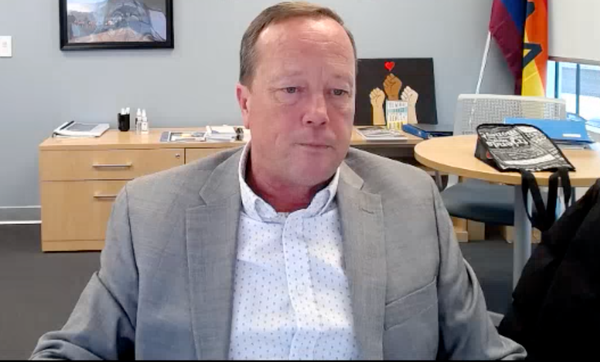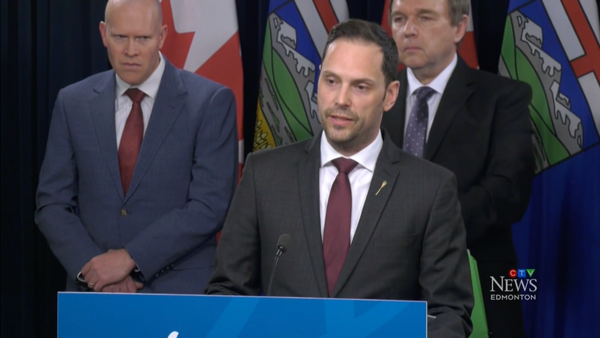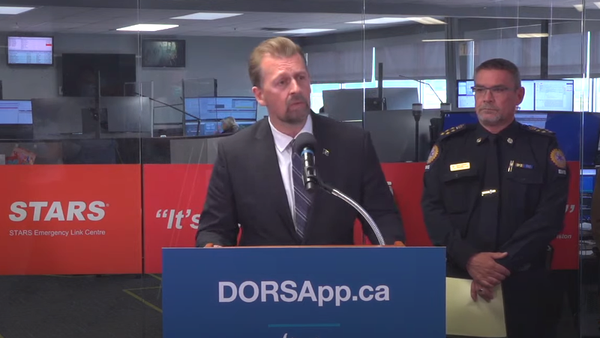UCP coordinated overdose prevention site closure with Red Deer city councillor
Documents show the United Conservatives were working with city councillors intent on driving the closure of supervised consumption services in Red Deer as early as 2022.
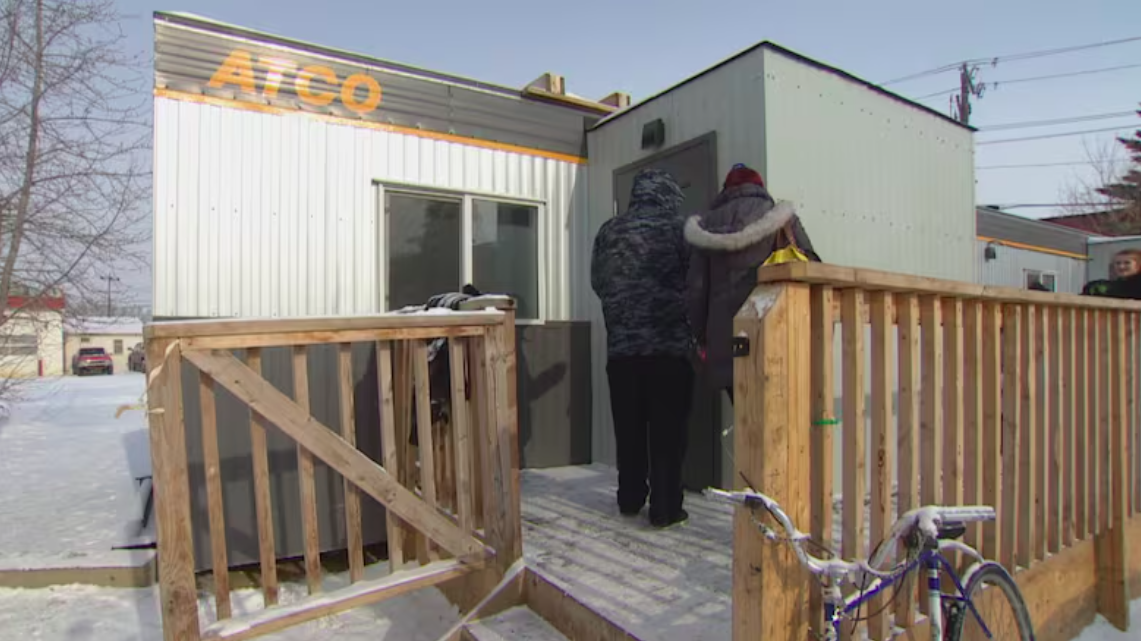
Jason Stephan, United Conservative MLA for Red Deer South, guided a city councillor on how to shut down Red Deer's only supervised consumption service, according to documents obtained by Drug Data Decoded after a nine-month appeal of a redacted freedom of information request.
In an email sent on October 19, 2022, Stephan suggested to Councillor Vesna Higham that Red Deer city council "request that the province transition the overdose prevention site out of their community" to initiate the site's closure. According to Stephan, this recommendation was relayed from then-Minister of Mental Health and Addiction Mike Ellis.
A year later, in December 2023, Higham proposed a notice of motion to close the site. In the run-up to the vote, the documents show Stephan was encouraging members of his constituency to express their opposition to the site to city councillors. Despite this, on the day of the vote, just six people spoke in opposition to the site, while 27 spoke in favour.
Stephan also emailed Red Deer city councillors on January 11, 2024 to inform them that "the Minister said he would listen" to their "motion to transition the drug consumption site out of Red Deer."
Higham's motion was passed in a dramatic city council vote on February 16, 2024. In addition to condemning thousands of site visits every month to high-risk unsupervised consumption, the vote was significant as the first instance of a Canadian city council voting to remove all municipal supervised consumption capacity.
The United Conservative government announced in September that it will formally close the site on April 1, 2025. In the same government statement, Minister of Mental Health and Addiction Dan Williams said:
"Our government will always listen to and take seriously the feedback we receive from elected local leaders. This is a well-thought-out plan that aligns with Red Deer’s needs and requests, which is why the province is making these changes and increasing support for the community."
That a UCP MLA was guiding a Red Deer city councillor on how to activate the overdose prevention site's closure calls into question Williams' assertion that the government was simply responding to a call by Red Deer city council.
Edmonton-based lawyer Avnish Nanda, who represents Red Deer overdose prevention site user Aaron Brown in his lawsuit against the Province, told Drug Data Decoded that Stephan's email "reveals that the UCP have committed to denying access to supervised consumption services in Alberta, which will only lead to more preventable deaths in this province."
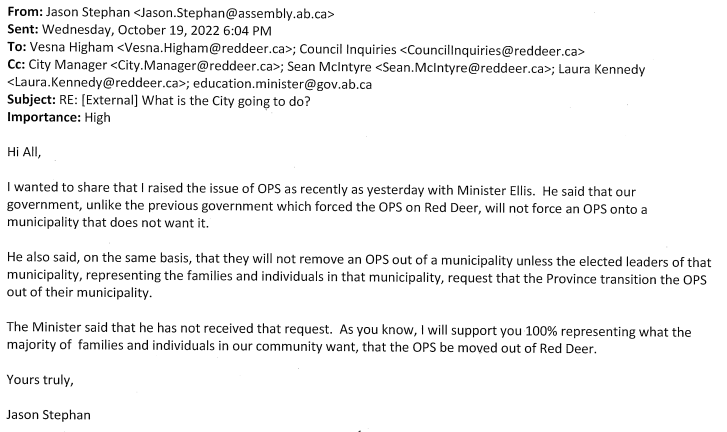
While Stephan's constituency office and the Ministry of Mental Health and Addiction did not respond to requests for comment made on December 13, Higham informed Drug Data Decoded that her decision to propose the notice of motion to Red Deer city council was not influenced by Stephan's instruction.
Details revealed by the City of Red Deer's FOIP office suggest otherwise. Following the appeal to the Office of the Information and Privacy Commissioner, the FOIP office removed the contested redaction, disclosing that the reason for the redaction using Section 21(1) of the FOIP Act was because "discussions between the City and the Province about the future of Red Deer's OPS site had not yet been made public. However, as of today's date, those conversations have happened in a public setting, as such we have decided to remove the section [sic]."
This suggests that the conversation between MLA Stephan and Councillor Higham, which was redacted in the City of Red Deer's response weeks after the fateful vote, is now being made public as a result of the decision by the Alberta government to close the overdose prevention site. In other words, the conversation may have been redacted because the Alberta government had not yet sealed the fate of the site.
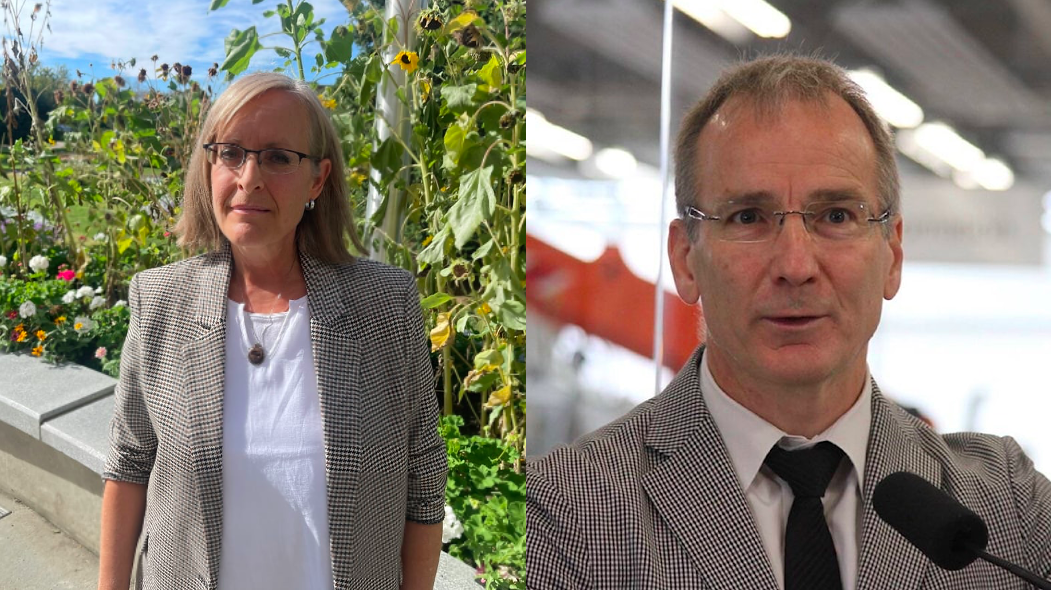
The relevant portion of FOIP Act Section 21(1) allows a public body to withhold information if its disclosure could harm relations between the Government of Alberta and a local government body or reveal information supplied in confidence by a government.
Therefore, the email from Stephan to Higham was either viewed as harmful to intergovernmental relations or too sensitive for public consumption. It was the only fully redacted correspondence in the original FOIP release made on March 1, 2024.
Taken together, the current revelations are the first direct evidence that MLAs in Alberta's governing party and cabinet have attempted to influence a municipality to close its supervised consumption capacity. The United Conservatives have long signalled their intention to close the sites, but the mechanisms by which they exert influence on other public bodies are largely unknown.
This is not, however, the first time a sitting Red Deer city councillor has been observed agitating for the closure of the site at the provincial level. Further complicating Higham's response, on February 1, 2023, Councillor Kraymer Barnstable was compelled to publicly apologize after he was overheard discussing "the overdose prevention site and the Provincial government’s plans moving forward" with a "provincial colleague." Barnstable did not participate in the February 2024 vote on Higham's motion to ask the Province to close the site.
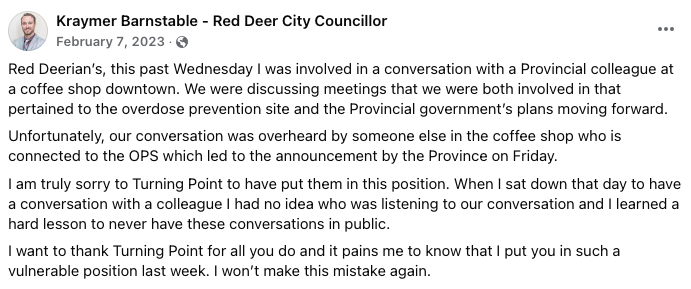
The documents released through the freedom of information process show both supportive and opposing comments by community members and a downtown music store toward the overdose prevention site. In the email exchanges, Councillor Higham laments the "existential threat" for downtown businesses posed by the city's overdose prevention site. Academic literature is in broad agreement that crime and social disorder are either unaffected or reduced by supervised consumption services.
In a separate set of emails to other city councillors and UCP MLAs, Higham promotes a piece from The Atlantic titled "Destigmatizing Drug Use Has Been a Profound Mistake." Its author, Keith Humphreys, is a close associate of the United Conservative government and served as chair of its Recovery Expert Advisory Panel.
In October 2024, a similar strategy appears to have been at play when Calgary city councillor Dan McLean crafted a notice of motion to have Mayor Gondek request the province close Calgary's only supervised consumption site. Ultimately, Calgary city council voted against the motion, pushing the decision back to the Alberta government.
It is unknown whether Councillor McLean coordinated with the Province on his notice of motion. However, McLean was "disappointed and angry" to see how the process he initiated "all fell apart."
This vote by Calgary city council was much more consequential than most Calgarians realized, as it stalled the apparent United Conservative strategy for closing the city's supervised consumption site.
While the hidden politics behind Red Deer's overdose prevention site closure finally begin to take focus, Calgary city council may have unwittingly dodged a severe escalation of the public health disaster in its most populous neighbourhood.
Drug Data Decoded provides analysis on topics concerning the war on drugs using news sources, publicly available data sets and freedom of information submissions, from which the author draws reasonable opinions. The author is not a journalist.



